It’s really no secret that nearly all of the best talent in NHL history belongs to the country of Canada. Over the years, it alone arguably has more talent in hockey than all of the other nations combined. If a lineup were to be constructed with the accolades and primes of individual players in consideration, what would it look like?
Forward Line 1: Wayne Gretzky, Mario Lemieux, Gordie Howe
In even in modern times, the true dominance of all three players on this line has to be respected. Wayne Gretzky needs no explanation, as he is arguably one of the greatest athletes ever. Coupled with Mario Lemieux in his prime and the revolutionary Gordie Howe, this line would be unstoppable.
Gretzky’s individual stats are absolutely ludicrous. There was only one season in his 20-year NHL career where he wasn’t nominated for an individual award, and yet he was still one of the best players in the league at that time despite being 34 years old. He holds the points record captive, with a total of 2,857 in just 1,487 games. Nobody has even reached 2,000, nor threatens to overtake him, so his glory will likely be safe for at least the next few decades. For eight seasons in a row, he held the Hart Trophy and title for the most points in the league. With four Stanley Cups, along with that, he might be the most dominant hockey player to ever live.
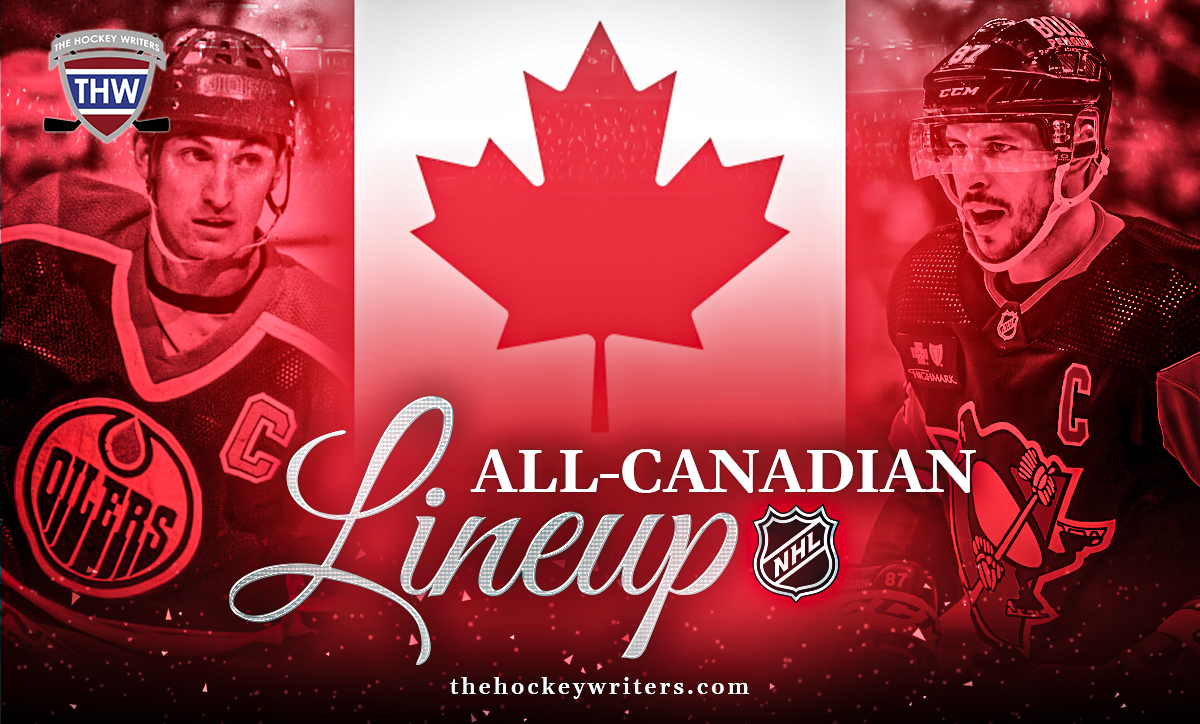
Lemieux’s tale is rather unfortunate, but it is one of pure determination. He only played 915 games in his career due to numerous factors, including injuries, a cancer diagnosis, and briefly retiring before coming back in his late 30s and still being one of the best players in the league, but he still amassed 1,723 points. It’s hard not to appreciate a player like him. Leading the league in points six times despite competing with Gretzky and his own injuries is pretty impressive. One of the most talented players in league history, there is no other place for him but on line one.
Related: Mario Lemieux: The Triumphant Return from Retirement
Before Gretzky was around, Howe was probably the greatest player in the history of the league. Him reaching only 100 points once in his NHL career might seem like he wasn’t a good offensive player, but he absolutely was. Winning the Hart Trophy six times and leading the league in points six times as well, he redefined hockey. For the most part, scoring in his era was lower than it was in the dead puck era, so what he was doing was still above what those around the league were doing at that time. Finishing with Hart Trophy votes 19 times in his career, he was truly special. The fact that he was able to score 41 points at the age of 51 in the NHL is nothing short of brilliant. He was a generational talent and defined the earlier stages of hockey in the NHL.
Forward Line 2: Sidney Crosby, Connor McDavid, Mike Bossy
Some are unwilling to mention current players in the same breath as the legends of the league, but their accomplishments can beat some of the best to ever play. For Sidney Crosby and Connor McDavid, they are both well ahead of their competition. Their linemate, Mike Bossy, was one of the best goal-scorers in the league’s history in his prime. If they all could play together at the same time, this line would do wonders.
In terms of award consideration, Crosby is unbeaten. Even when he was battling concussions, he was still able receive votes for an award every single season of his career to this point. He is a generational player and gave the league a new superstar when those of the 1990s were starting to fade. With no season in his career below a point per game and over 1,500 total points in his time in the NHL, his dominance in the 21st century has been virtually unmatched.
McDavid has been the only player to truly give Crosby a run for his money. To put it simply, he might be the most talented player to ever play in the NHL. Very few players have ever pulled off the one-man circus acts that he does, like being able to deke past an entire team before scoring. He has done this several times, and he has done it in the most advanced era of hockey to date. Leading the league in points five times in his short career, winning the Hart Trophy three times, and being the first player to score 150 points in a season since Lemieux, he already joins great company. He came into the league as a new dead puck era was forming, and suddenly, offense vastly went up. He will go down as one of the greatest players ever and still has a long career ahead of him.
When he was healthy, Bossy was arguably the best goalscorer of his generation. Just the second player in NHL history to score 50 goals in 50 games, very few had defenses and goaltenders figured out quite like he did. Scoring 573 goals and winning four consecutive Stanley Cups in his 753-game career, he still remains one of the most accomplished players in the league’s history despite having a short time in the NHL due to injuries.
Forward Line 3: Mark Messier, Joe Sakic, Steve Yzerman
Forming a line of players who all were at or near their prime in the 1990s, Mark “Moose” Messier, Joe Sakic, and Steve Yzerman join this club. With a cumulative five Stanley Cups in the decade, they were three of the biggest faces of that era. They also happen to be some of the greatest players in NHL history, as well.
Although Messier and Gretzky helped form one of the greatest dynasties in league history, it was after his teammate left that the Moose was able to show that he was a legendary player in his own right. Winning two Stanley Cups in his career after he was separated and piling up nearly 1,900 points in his 1,756-game career, he was one of the best.
Sakic was one of the main stars of a borderline dynasty in the mid-1990s and early 2000s. Even when he was well into his 30s, he was still scoring at an extraordinary rate. With two Stanley Cups, a Hart Trophy, and 1,641 points in 1,378 career games, he doesn’t belong anywhere else but on this team.
Yzerman, the only one of the three in the 150-point club, was never able to lead the league in points or capture a Hart Trophy. However, the 1,755 points he scored in his career rank seventh all-time, and he did so, ranking 21st all-time in terms of games played. He helped start a dynasty and was a huge piece in NHL lore.
Forward Line 4: Phil Esposito, Bobby Clarke, Guy Lafleur
Now looking at a line that would have cruised through the 1970s, Phil Esposito, Bobby Clarke, and Guy Lafleur make up this trio. They won every single Stanley Cup in the decade, making the choice to make this line the way it is pretty self-explanatory.
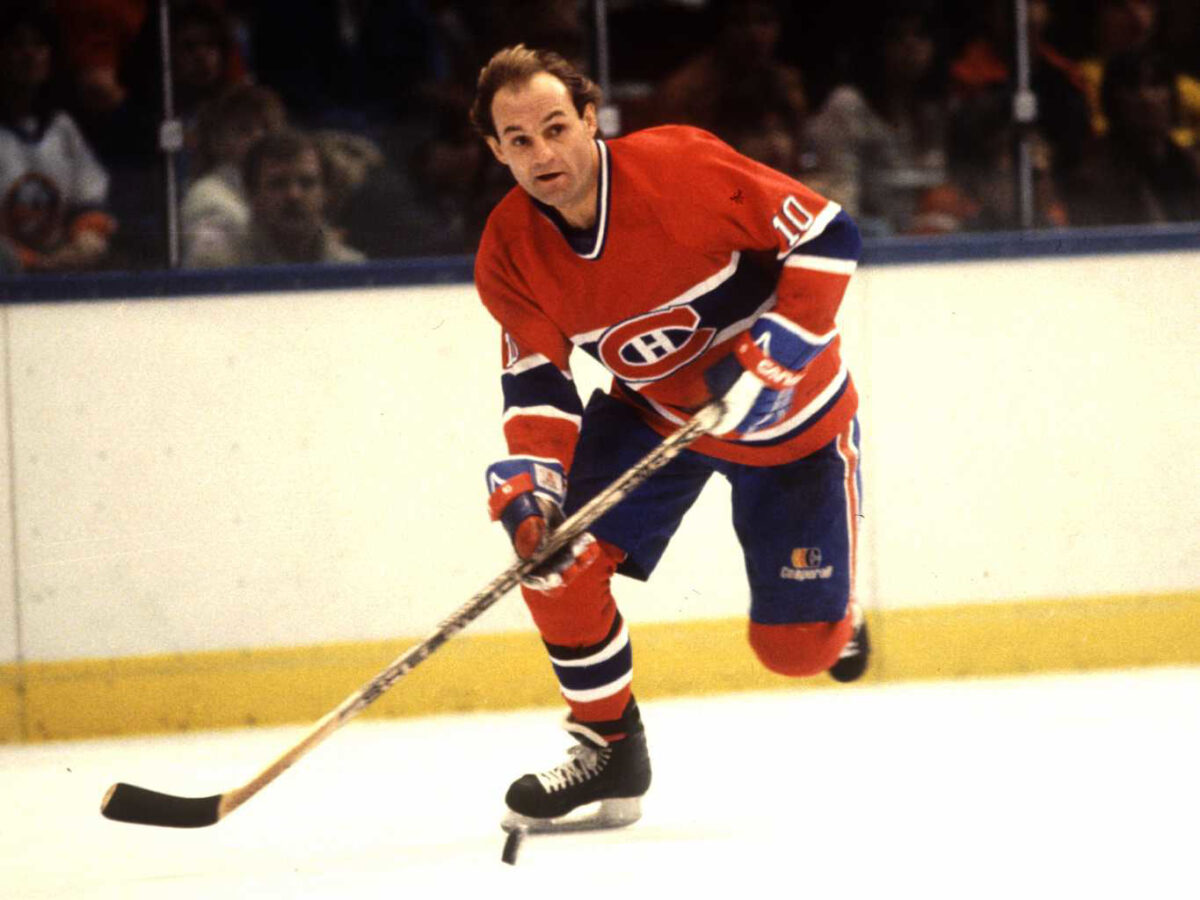
Esposito was really one of the first players to modernize scoring. Not only was he the first player to score 70 goals, but he was the first to score 60, as well. For six straight seasons, he led the league in goals. This is something that not even Gretzky ever did. He had two Hart Trophies and two Stanley Cups round out his resume, cementing him as arguably the best hockey player of the 1970s.
Clarke’s offensive totals might not jump out when compared to some other forwards on this list, but scoring 1,210 points in just 1,144 games in the NHL is still a fantastic feat. Even when his offense started to regress due to age, his defense certainly did not. One of the greatest two-way players of the 1970s, he deserves to be here. Like Esposito, he has two Stanley Cups, but he has three Hart Trophies rather than two. For a few seasons, he was debatably the best all-around player in hockey.
To round out the offense, Lafleur makes an appearance. He led the league in points for three seasons in a row and won two Hart Trophies but was also good enough to win five Stanley Cups and was the biggest offensive contributor for four of them. Despite playing most of his prime in a heavily competitive decade, he too has a case to be one of the greatest hockey players of the 1970s.
Extras: Maurice Richard, Ron Francis, Marcel Dionne
It was really tough to leave someone like Maurice Richard out of the lineup, but the competition for this team is rather incredible. He helped define goal scoring in an era that lacked it and led the league in them five times in his career. With eight Stanley Cups, he is one of the greatest players ever. However, the tightness of the lineup and him never leading the league in points and only winning a single Hart Trophy was what did it.
Ron Francis was the king of consistency in his time, with over 1,700 games played and nearly 1,800 points to go along with that, but the only major individual awards he won in his career were the Selke Trophy once, the Lady Byng Trophy three times, and the King Clancy Trophy once. Despite an extraordinarily high point total, he never quite led the league in them. He won two Stanley Cups, but he just misses the team for not having the same individual success as those on the roster.
As for Marcel Dionne, he is in the same boat as Francis, only he was never able to capture a Stanley Cup. He did lead the league in scoring once but never won a Hart Trophy to go along with his 1,771 points in 1,348 games. The legendary Los Angeles King just barely misses the mark here.
Defense Pair 1: Bobby Orr, Doug Harvey
This first defensive pair consists of, arguably, the two greatest defensemen to ever play the game. Bobby Orr and Doug Harvey combined for 15 Norris Trophies in just 31 seasons in the league, making this vintage pair a potential dynamo.
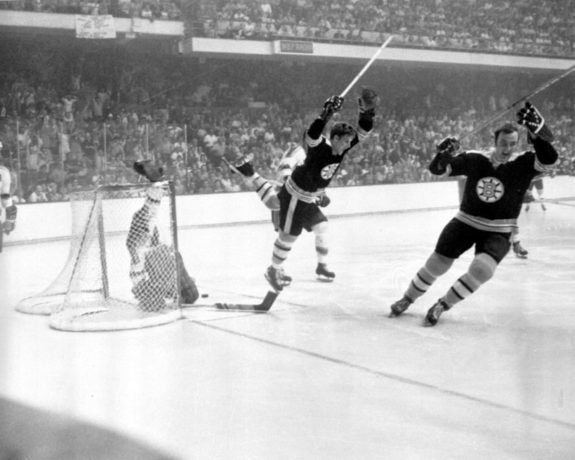
Orr’s NHL career was immensely short, yet one of the most successful for a defenseman ever. Despite playing just 657 games in the NHL due to injuries, he stands as the all-time leader in Norris Trophies with eight, which he won all consecutively. He led the league in points twice, plus-minus six times, and won the Stanley Cup two times. Even though his career was extraordinarily short, he retired as one of the most accomplished defenders ever. As such, he is arguably one of the best players in league history.
Harvey had a much longer career, but he, too, dominated his era. Right before Orr came around, it was him who was stealing all of the Norris Trophies. He won seven in an eight-year span and won the Stanley Cup six times. From the 1954-55 season through the 1974-75 season, the two won 15 of the total 21 Norris Trophies possible. Both need their proper respect.
Defense Pair 2: Paul Coffey, Ray Bourque
In this pair, the two highest-scoring defenders of all time are put together. Paul Coffey and Ray Bourque scored at a level higher than a large majority of forwards during their time in the league, making them two of the greatest offensive defensemen ever.
Coffey’s scoring as a defenseman was quite ridiculous. Of course, he dominated in the 1980s and early 1990s, which were filled with goals, but only he and Orr have scored 100 points in a season as a defender more than once. The 80s and 90s star did it five times. He rounded out his resume with three Norris Trophies and four Stanley Cups, making him a lock for Canada’s lineup.
Throughout his 22-season career, Bourque never went without being voted in the top 10 for the Norris Trophy. He won the award five times, finished as a finalist 15 times, and won his first and only Stanley Cup in his very last season in the league. He stands at second all-time in terms of shots on goal, as he was known to fire the puck very frequently. He wasn’t a standard defender, which also helps make him one of the best ever. His 1,579 career points and holding the record for the most career points as a defenseman helps solidify that.
Defense Pair 3: Larry Robinson, Denis Potvin
When Orr was out of the equation, Larry Robinson and Denis Potvin were arguably the two best defensemen of the 1970s. Both having multiple Norris Trophies and several Stanley Cups, it was almost impossible to leave either of them off.
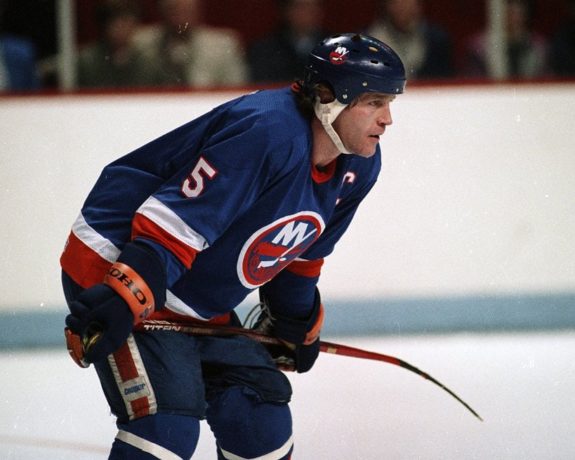
Robinson was one of the best of the 1970s, and his accolades show why. He won six Stanley Cups in his career and was a major factor in five of them. He was able to capture two Norris Trophies, a Conn Smythe Trophy, 958 points in his career, and ended with a plus-722 rating as well.
As for Potvin, he was one of the first great defenseman scorers before it became commonplace in the 1980s and part of the 1990s. He is in the exclusive club of defenders who scored 100 points in a season and even won the Norris Trophy three times and the Stanley Cup four times. With 1,052 points in just 1,060 games, he is one of the very few defenders who were able to score at around a point per game during a career.
Extras: Scott Stevens, Al MacInnis
The hard-hitting Scott Stevens was left off of the list for the simple fact that he never won a Norris Trophy. While he was a major factor in three Stanley Cup wins, the individual accolades are lacking a bit. He came close to being crowned as the best defenseman in the league several times but never sealed the deal. As a result, those that have are ahead of him.
Al MacInnis was a very tough player to leave off, as he was one of the best offensive defensemen in NHL history. It’s hard to compete with 1,274 points in 1,416 games, but his lone Stanley Cup and Norris Trophy only make him borderline for this lineup. It wouldn’t be fair to give him his proper kudos, but he simply doesn’t make this stacked lineup.
Goaltenders: Patrick Roy, Jacques Plante
There are few more recognizable goaltenders in the history of the NHL than Patrick Roy and Jacques Plante. They played at completely different times, but both were equally as important to evolving the role of the goaltender.
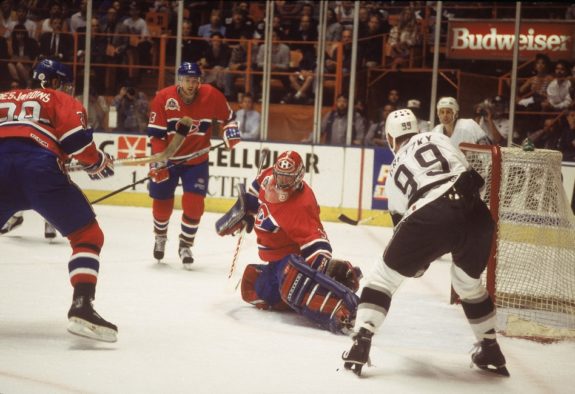
Roy has a case for being the best goaltender in NHL history, and his case is very clear. He led the NHL in save percentage (SV%) four times in his career and did that when the league was offensively driven. His butterfly style paved the way for the future and makes his impact essentially last forever. Three Vezina Trophies, three Conn Smythe Trophies, and four Stanley Cups certainly give him a case for being the best Canadian goaltender ever.
Plante’s dominance, coupled with his insane longevity, makes him the backup for this team, and he might have a case for being the starter. He won seven Vezina Trophies after leading the NHL in SV% five times, won the Hart Trophy once, and won six Stanley Cups. He led the playoffs in SV% six times, making him one of the best performers at any stage. He had a league-leading .944 SV% and 1.89 goals-against average (GAA) when he was 42 years old, which furthers his already stacked set of accomplishments.
Extra: Martin Brodeur
Martin Brodeur was one of the most revolutionary goaltenders in history. He essentially invented the trapezoid rule with his elite puck-handling ability and stands as the winningest goaltender in NHL history, leading the league in wins nine times in his career. However, he did all that without ever leading the league in SV%, yet won four Vezina Trophies in the process. His career goals saved above average (GSAA), which tracks SV% relative to the rest of the league, was legendary but not quite up to par with Roy or Plante. The battle here is close, but Brodeur loses by just a hair.
Canada’s all-time lineup is incredibly stacked. There are very few wrong options, and any team that is made of it is largely based on opinion. In their primes, this would be the best hockey team ever assembled, with very few questions asked.
